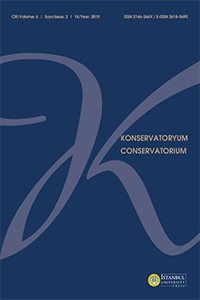Abstract
Historical musicology, which is a method within the discipline of musicology, is based on composer biographies and works, whereas systematic musicology, which includes analytical and empirical methods, is based on the musical analysis of works. These historical and analytical studies represented the relationship between music and science from the 19th century to the 20th century. After the 20th century, researches about the science of music moved to a new, critical and multi-faceted field in social, cultural, political and artistic contexts as well as historicity ones. The evaluations of composer biographies that constitute the historical knowledge of music have been handled in a holistic and multi-faceted framework with this new orientation. In this article, which is prepared based on a new, critical, multi-disciplinary way of thinking within the framework of New Musicology, the determinant composer of the Classical Period W. A. Mozart was evaluated according to Becker’s Art Worlds, which is sociological theory. W.A. Mozart’s way of thinking shapes his art life and this was examined through the slices of his life and through his own words using the categories of Integrated Professionals and Incompatibles in Becker’s classification of artist behavior. This article aims to create a functional and interdisciplinary meaning for the formation processes of W. A. Mozart’s art life far from philosophical, aesthetic and value judgments. It is considered that this evaluation will bring a different perspective to biography studies in the contexts of generally accepted (canonical) thought.
Keywords
References
- Attali, J. (2005). Gürültüden müziğe. (G. G. Türkmen, Çev.). İstanbul: Ayrıntı Yayınları.
- Ayas, G. (2015). Müzik sosyolojisi: Sorunlar yaklaşımlar tartışmalar. İstanbul: Doğu Kitabevi.
- Becker, H. S. (1976). Art worlds and social types. American Behavioral Scientist, 19(6), 703–718 (https://journals. sagepub.com/doi/10.1177/000276427601900603
- Becker, H. S. (2013). Sanat dünyaları. (E. Yılmaz, Çev.). İstanbul: Ayrıntı Yayınları.
- Chrysander, F. (1863). Jahrbücher für musikalische Wissenschaft. Leipzig: Breitkopf & Härtel. Elias, N. (2000). Mozart bir dahinin sosyolojisi üzerine. İstanbul: Kabalcı Yayınları.
- Fubini, E. (2006). Müzikte estetik. (F. Genç, Çev.). Ankara: Dost Kitabevi Yayınları.
- Gilmore, S. (1988). Schools of activity and innovation. Sociological Quarterly, 29, 203–219. https://doi. org/10.1111/j.1533-8525.1988.tb01251.x
- Hodeir, A. (2011). Müzikte türler ve biçimler. (İ. Usmanbaş, Çev.). İstanbul: Pan Yayıncılık.
- Kerman, J. (1985). Contemplating music. Cambridge, Massachusetts: Harvard University Press.
- Kerst, F. (2005). Bir insan ve sanat adamı olarak kendi sözleriyle Mozart. (M. Savaş, Çev.). İstanbul: Bileşim Yayınevi.
- Logier, J. B. (1827). System der Musik-wissenschaft. Berlin: Heinrich Adolph Wilhelm Logier.
- Mugglestone, E., & Adler, G. (1981). Guido Adler’s ‘The scope, method, and aim of musicology,’ (1885): An English translation with an historico-analytical commentary. Yearbook for Traditional Music, 13, 1–21. http:// www.jstor.org/stable/768355
- Publig, M. (2004). Deha‘nın gölgesinde. (İ. Özdemir, Çev.). İstanbul: Can Yayınları.
- Yöre, S. (2016). Müzikolojiye giriş. Yayımlanmamış ders notu, Müzikoloji Bölümü, İstanbul Üniversitesi, İstanbul.
Abstract
Müzik ve bilim ilişkisinin kurulduğu müzikoloji disiplininde bir yöntem olarak yer alan tarihsel müzikoloji, besteci biyografileri ve eserleri; analitik ve deneysel yöntemli sistematik müzikoloji ise eserlerin müziksel analizleri üzerinden oluşturulmuştur. Tarihsel ve analitik çerçevedeki bu çalışmalar 19. yüzyıldan 20. yüzyıla kadar müzikbilim ilişkisini temsil etmiştir. 20. yüzyılla birlikte müziğin bilimine dair araştırmalar, tarihselliğin yanı sıra sosyal, kültürel, politik, sanatsal kapsamlarda çok yönlü, yeni ve eleştirel bir alana doğru taşınmıştır. Müziğin tarihsel bilgilerini oluşturan besteci biyografilerine ait değerlendirmeler de bu yeni yönelimle birlikte bütünsel ve çok yönlü bir çerçevede ele alınmıştır. Yeni müzikoloji çerçevesinde eleştirel ve çok disiplinli düşünme biçiminden yola çıkılarak hazırlanan bu makalede, Klasik Dönem’in belirleyici bestecisi W.A.Mozart, Becker’ın sosyolojik bir kuram ortaya koyduğu Sanat Dünyaları’na göre değerlendirilmiştir. W.A. Mozart’ın sanat yaşamını yönlendiren düşünce biçimi, hayatından kesitlerle ve kendi sözleri üzerinden, Becker’ın sanatçı davranış düzeni sınıflandırmasında yer alan Entegre Profesyoneller ve Uyumsuzlar kategorileriyle incelenmiştir. Bu makalenin, W.A. Mozart’ın sanat yaşamının oluşum süreçlerine, felsefi, estetik ve değer yargılarından uzaklaşan, işlevsel ve disiplinler arası bir anlam oluşturması hedeflenmiştir. Bu değerlendirmenin, genel geçer kabul edilen (kanonik) düşünce bağlamlarındaki biyografi çalışmalarına farklı bir bakış getireceği düşünülmüştür.
Keywords
References
- Attali, J. (2005). Gürültüden müziğe. (G. G. Türkmen, Çev.). İstanbul: Ayrıntı Yayınları.
- Ayas, G. (2015). Müzik sosyolojisi: Sorunlar yaklaşımlar tartışmalar. İstanbul: Doğu Kitabevi.
- Becker, H. S. (1976). Art worlds and social types. American Behavioral Scientist, 19(6), 703–718 (https://journals. sagepub.com/doi/10.1177/000276427601900603
- Becker, H. S. (2013). Sanat dünyaları. (E. Yılmaz, Çev.). İstanbul: Ayrıntı Yayınları.
- Chrysander, F. (1863). Jahrbücher für musikalische Wissenschaft. Leipzig: Breitkopf & Härtel. Elias, N. (2000). Mozart bir dahinin sosyolojisi üzerine. İstanbul: Kabalcı Yayınları.
- Fubini, E. (2006). Müzikte estetik. (F. Genç, Çev.). Ankara: Dost Kitabevi Yayınları.
- Gilmore, S. (1988). Schools of activity and innovation. Sociological Quarterly, 29, 203–219. https://doi. org/10.1111/j.1533-8525.1988.tb01251.x
- Hodeir, A. (2011). Müzikte türler ve biçimler. (İ. Usmanbaş, Çev.). İstanbul: Pan Yayıncılık.
- Kerman, J. (1985). Contemplating music. Cambridge, Massachusetts: Harvard University Press.
- Kerst, F. (2005). Bir insan ve sanat adamı olarak kendi sözleriyle Mozart. (M. Savaş, Çev.). İstanbul: Bileşim Yayınevi.
- Logier, J. B. (1827). System der Musik-wissenschaft. Berlin: Heinrich Adolph Wilhelm Logier.
- Mugglestone, E., & Adler, G. (1981). Guido Adler’s ‘The scope, method, and aim of musicology,’ (1885): An English translation with an historico-analytical commentary. Yearbook for Traditional Music, 13, 1–21. http:// www.jstor.org/stable/768355
- Publig, M. (2004). Deha‘nın gölgesinde. (İ. Özdemir, Çev.). İstanbul: Can Yayınları.
- Yöre, S. (2016). Müzikolojiye giriş. Yayımlanmamış ders notu, Müzikoloji Bölümü, İstanbul Üniversitesi, İstanbul.
Details
| Primary Language | Turkish |
|---|---|
| Journal Section | Research Article |
| Authors | |
| Publication Date | January 7, 2020 |
| Submission Date | December 10, 2019 |
| Published in Issue | Year 2019 Volume: 6 Issue: 2 |

